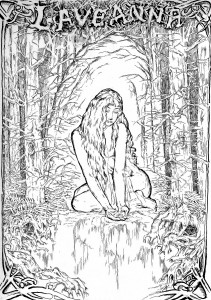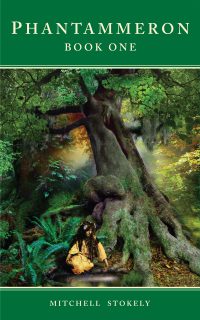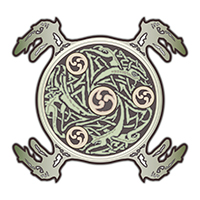Note: The story below will appear in an upcoming novel in the Phantammeron epic fantasy series. The tale of Laveanna will appear in book five (5) of the Phantammeron. As of 2015, only book one (1) of the Phantammeron has been released, and is for sale as an eBook at Amazon Kindle. Books two (2) and three (3) will appear in 2016 and 2017. – the author
Preface:
Before I share some writing, I want to make a quick point…
One of the things I am exploring in the Phantammeron is the explicit expression of tragedy in all its colorful forms. We are all familiar with the Tragic Hero. We understand that in Western culture, often the price for fulfilling a quest is the suffering or even death of our heroes – the ultimate sacrifice. But I am now beginning to feel that the psychological power of good story-telling and character development within the realm of tragedy is a lost art in our modern world. That has formed the premise for much of what the Phantammeron, my novel, has been about.
I have spent years studying many of the ancient folk tales, faery tales, and legends. One of the things I see in the ancient stories is both the power of really well-articulated story-telling but also the culturally important expression of the classic tragic hero. These heroes, these characters and their tales form the foundation for a very important cultural archetype; one that stands the test of time across generations and which endures through changing political movements. These archetypes transcend us and continue influencing us through centuries of time. They remain a powerful force long after we are gone, inspire new generations, and generations after those. They are enduring and profound expressions of our being. They carry with them profound eternal moral and spiritual lessons, and we are forever “apprentices” to the internal and transcendent messages hidden in these ancient myths.
Yet, they seem so forgotten by this generation. These stories and the lessons they teach us seem almost totally stripped from today’s writers and story-tellers, much less our society as a whole. We have lost the power truly understand these stories and myths; lost the power of our myth-making, and with it the greatest elements of story-telling as a whole. We have lost the power of our modern stories to move us beyond shallow one dimensional characters to the three (and even four) dimensional characters found in the monstrously powerful ancient heroes of Beowulf, Siegfried, and Arthur. The modern writer, it feels to me, in many cases has lost the ability to write about believable, tragic heroes who can truly cross over our conscious mind to the unconscious. Losing the ability to write about meaningful modern tragic, self-sacrificing characters leaves us stripped of everything necessary to connect us with these primitive symbols, which in turn have broken the bonds of critical archetypes, which connect us culturally in the Western World to our ancestors, to each other, to our world, and even to life! We have truly lost something in our culture when it comes to tragic heroes and story-telling.
The fact is, the ancient myths and stories that fill our libraries today, still hold these treasures; these secret “formulas”. They hold these mystical books and tales that have yet the power to emotionally and psychologically move us, if we would just listen. So, all is not lost to the modern story-teller and writer, as long as we have libraries and we record these tales and pass them on to future generations. We just need to invest energy into understanding how and why these legends affect us the way we do.
My point of all this is that good high quality mytho-poetic story-telling and well-thought out tragic hero tales deserve our time and incubation as story-tellers so that they have the emotional impact they need to have on the reader and viewer. Any writer who has ever made a film that carries those qualities understands exactly what I am talking about. I think the great books and great films embrace all this. But many have not. That is what I have tried to do in my own writing, and in constructing the larger tale of the Phantammeron.
The Stories:
The initial chapters of the Phantammeron involves the early history of the world of Galaia and the Children of Shining. After the world was made from the flesh of the All-Father, Aman, his children began a mass migration to his world and settled there. Upon their arrival, they built Partholand and the City of the Gods, as was the original Will of The Maker, before the promise of heaven was taken from them. But in building this place, the Children invited in the evil of the Fallen Child of Light, Fey-Bala. His original deception created the great wars between the Gods and eventually the Children, who’s hearts were originally aligned for perfect peace in the new world, but now aligned for war and perverted towards eternal power and unending hatred of their siblings. As these wars ensued, there erupted great battles between earth and sky, the seas and the winds and then the water with the land, all striving to destroy the other and take over that part of Aman’s flesh for their own dominion. In parallel was a horrible curse – a curse of forbidden love, that in it’s original form, initially strove to bind the Children of Shining with the immortal elements and the parental powers that in those days still ruled the world. It seemed inter-marriage of these forces would bind the parts as one. But this too, was part of the original curse of the Argyl Pyr – the Cauldron of Death presented by Bala, and which held the last drops of the Waters of Time, the one thing that sustained Celebreava in Phantaia. The curse of this cup and its waters was such that when those waters touched the lips of two lovers, they were bound till death to this love, and at all costs, would in the end destroy the world and all others in sacrifice to sustain it and defend it. And many did just that, turning their sacred vows towards evil and the demise of the world, while ultimately destroying themselves and those around them who would suffer so horribly under that curse.
The “Slaying of Laveanna” is the death of one such character. Laveanna is the daughter of Lyrlu, the Queen of the Oceans and Lordess of the Waters of the World. As such she was a child of the oceans….and water spirit and sprite. She like many maintained a love and desire for her land-born other half – her mother’s brother’s son – her cousin. But that went against Lylru’s desire, which was to overwhelm Maru’s earthly realm and take it for her kind. Yet, Laveanna bore her love for her cousin, Fey-Hannon in secret until the evil workings of Bala’s minions presented her with a means to eternally bind her love for Hannon with a single sip from the waters of the cursed Argyl-Pyr. In so doing she sealed her fate to Hannon and deceived her mother and doomed herself and Hannon to death by that deception. This excerpt below is from the end of that tale…
Laveanna was captured by the Skathas, then taken to the top of a great mountain, far from the waters that sustained her life. Stripped bare, she lay weeping, as the howling winds echoed across the vast chasm before them. But for love of Fey-Hannon she would not surrender his hidden place. It was then, she was presented with the great Flame of Monadas, from which she cringed in fear. The Skathas then burned from her body her remaining raiments, as she wept. But rising up, she cried “I would wish only that my children should not see or know my shame, but when they come to this mountain realm, they find some comfort and the joys of my mother’s lands”. After which, she lept off the towering cliff to the craggy rocks below, from which the liquid life that coursed through her veins flowed out upon the world, and sped from that mighty mountain, and every lesser hill and slope, washing the valleys and the marshes until it came to the sea, her blood. And so was the death of Lyrlu’s daughter, gentle Laveanna. So have the daughters of the Children of Light drank from her blood, the springs that well up at the center of the earth, and in turn watch them sadly return homeward to the sea.
In time, Lyrlu her mother, would come here at the end of her days when the seas were calmed and so much that was, was lost for all time. There she sought answers to the fate of her child. But in time, she knew the path her daughters spirit took, yet could not find her form. Only the rocks spoke of her, and laughed forever after of the fate of Laveanna. But others say Lyrlu knew the cry of the rapids as that of her daughters return, and so in time welcomed her spirit home with open arms. And so every cataract from henceforth filled the air with a glorious blast of her joyous return. Yet, in the silent brooks below, as the light of every new dawn dances across the still waters of that hidden pool, there was yet heard by some, one last whisper of that lost and forlorn Love of Laveanna for her Fey-Hannon, until such time as those waters finally fell silent, drifting into the ever-widening rivers below and finally merging with her mother’s solemn and sorrowful sea.




